Follow Us!
HI-COVE Stakeholder Event – May 2023
We are coming to the end of the Hearing from the unheard: impact of Long Covid in Black and minority ethnic groups in the UK (HI-COVE) study (click here for more details about the study).
The HI-COVE study aimed to understand what it is like for people from under-served groups, in particular people from racially minoritised backgrounds, to experience Long Covid. We conducted a qualitative study, interviewing people from a diverse range of backgrounds. We published the plans for our work (click here for study protocol).
So far, we have interviewed 30 participants about their experiences of living with Long Covid. Participants include 15 men and 15 women from different, ethnic minority backgrounds, as well as from a range of occupational and social backgrounds. We’ve interviewed participants with varying durations of living with Long Covid, and who live in different parts of England. Importantly we’ve interviewed individuals with diagnosis of Long Covid and those without a diagnosis but who display Long Covid symptoms.
The study has been supported by an active Patient Advisory Group and an Expert Advisory Panel. Our patient group is made up of people living with Long Covid or who care for someone living with Long Covid, from different ethnicity minority backgrounds. Our Expert Advisory Group is made up of academics and clinicians interested in health research and/ or health inequalities amongst minoritised communities.
We held our second online Stakeholder meeting on 23rd May 2023, with the aim of presenting some of our study findings, and asking webinar participants to comment on our results, reflect on the meaning and implications of our findings, and advise the research team what should be done next.
Tom Bailey, an Artist, illustrated the event, summarising key themes identified during the workshop.
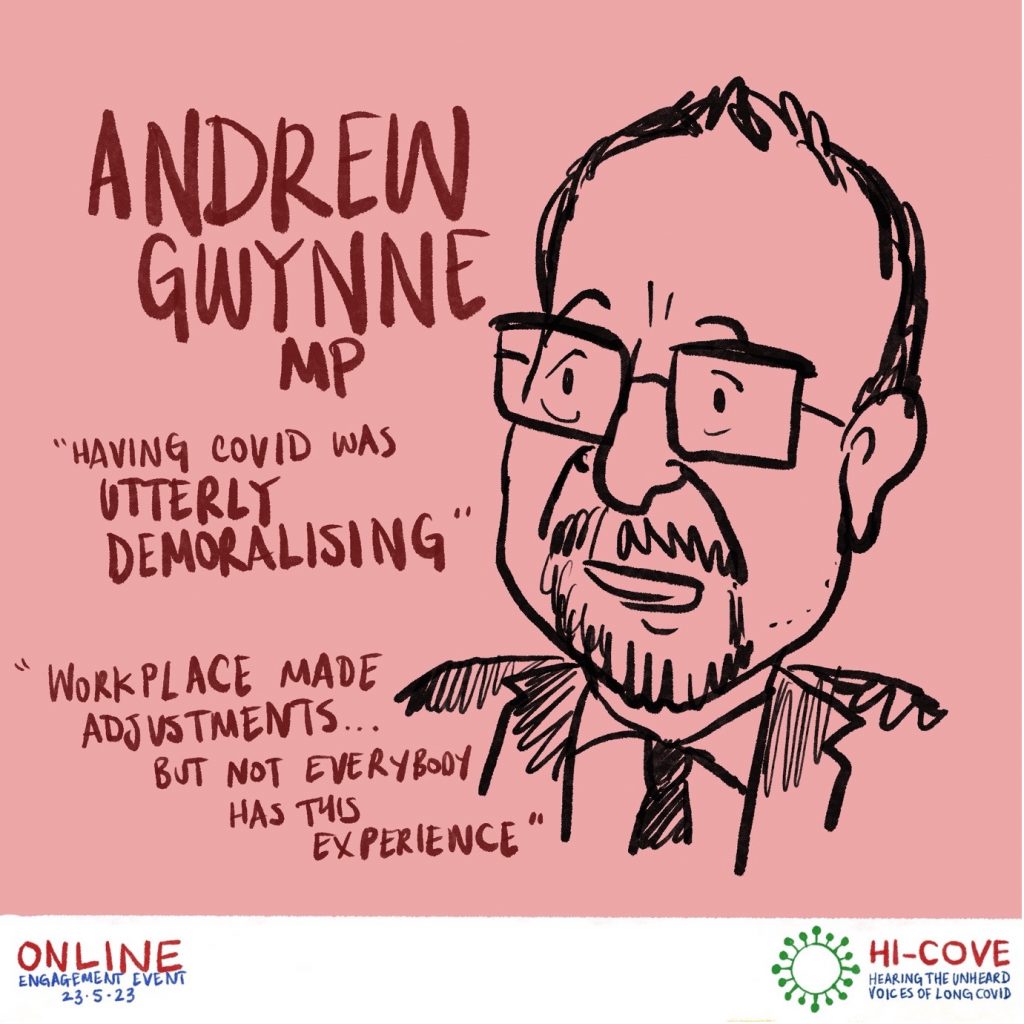
The Right Honourable Andrew Gwynne, Labour MP, and Shadow Minister for Health and Social Care, started off the webinar with a reflection of his experiences of living with Long Covid. He stressed the importance of supportive and sensitive employers supporting people with Long Covid back to and in work. However, not all people have such support, as noted by our interview participants, making it challenging to adjust their daily lives in managing Long Covid. Click here to read more about the impact of Long Covid on employment and what can be done to support people in work.
A resource is available for employers (click here).
Lead researcher, Dr Nina Smyth, spoke about some of the HI-COVE study findings and more details were given by Professor Carolyn Chew-Graham who outlined the problems described by interview participants in getting help for their symptoms of Long Covid. Some people described how they had to struggle to access support and manage their own care.
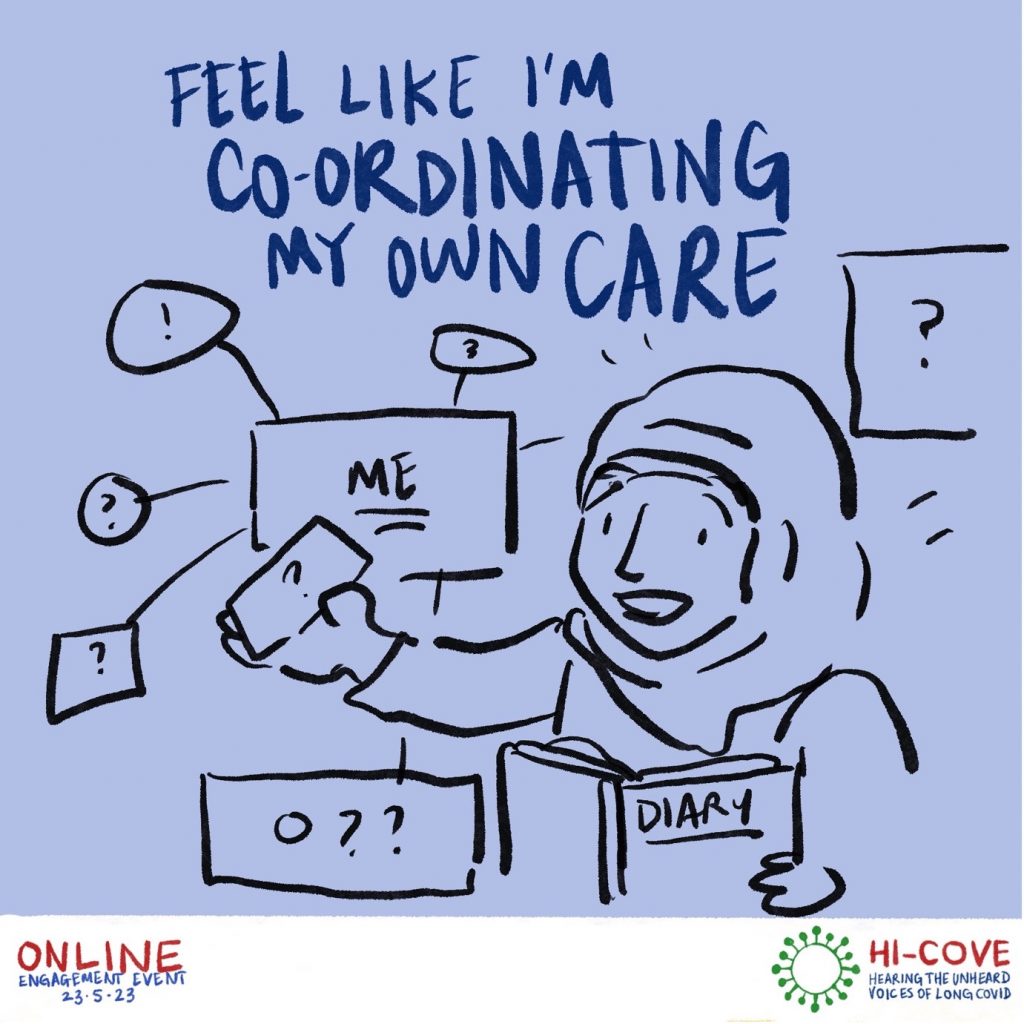
Study participants described the stigma associated with Long Covid amongst some ethnic groups, and described how they experienced another layer of discrimination due to their ethnic background. Other research by Professor Nisreen Alwan documents the extent to which people living with Long Covid experience discrimination and stigma connected with the condition, and how they may conceal their condition (click here to read more about this).
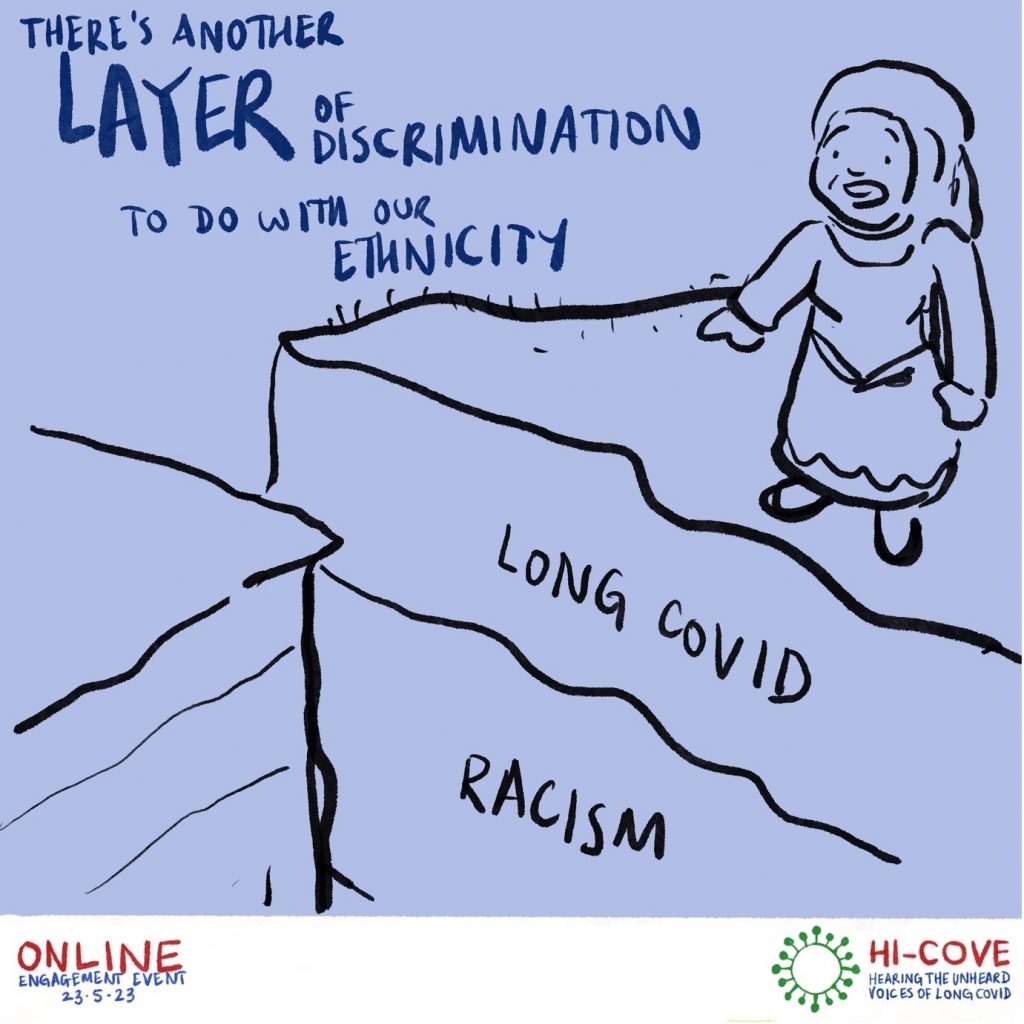

Study participants talked about how some healthcare professionals don’t understand Long Covid, and some had a feeling that they were not motivated to understand this condition. One clinician who attended the event reflected that typically GPs will send Long Covid patients to the GP who has created more of a speciality and interest in understanding the condition, as they have limited time to spend with Long Covid patients.
Additionally, our interview participants reflected on the challenging relationships with healthcare professionals and the gaslighting some have experienced.

Dr Becky Band, member of HI-COVE team, described the adjustments people make to their life in managing Long Covid. However, self-management is challenging, and not possible for all depending on people’s individual circumstances. Many people engage in trial and error to find what works for them to adjust to new ways of life and managing symptoms. Self-management is a fine balancing act where patients are having to manage their own expectations, their own identities, what they were able to do before, what they think they should be doing, all the while trying not to push themselves too hard and crash. They must also manage difficult emotions. Becky spoke about some of the wider support that some people with Long Covid draw on, and find valuable, from families and friends, religion and spirituality, engagement in intentional activities and active rest.

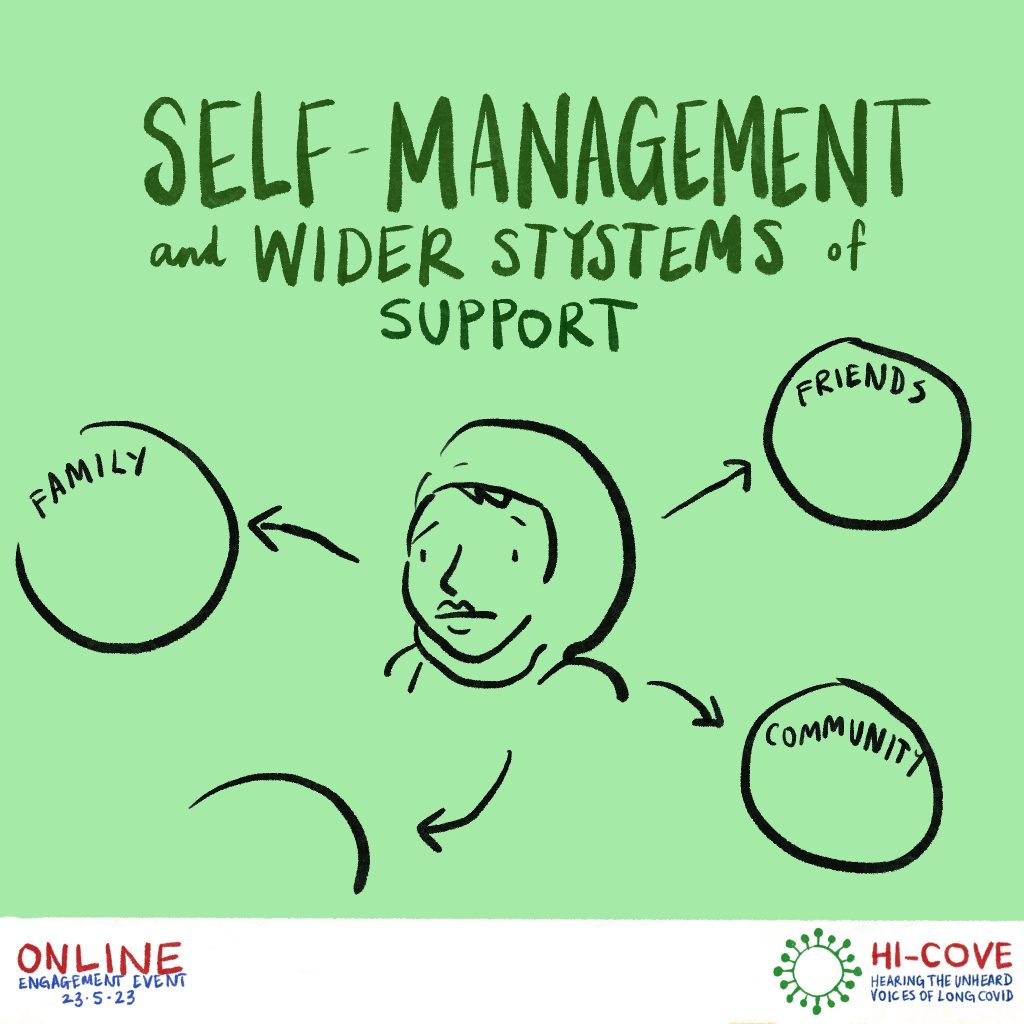
Members of the Patient Advisory Group reflected on their experiences of Long Covid and how being part of HI-COVE team had given them a voice.
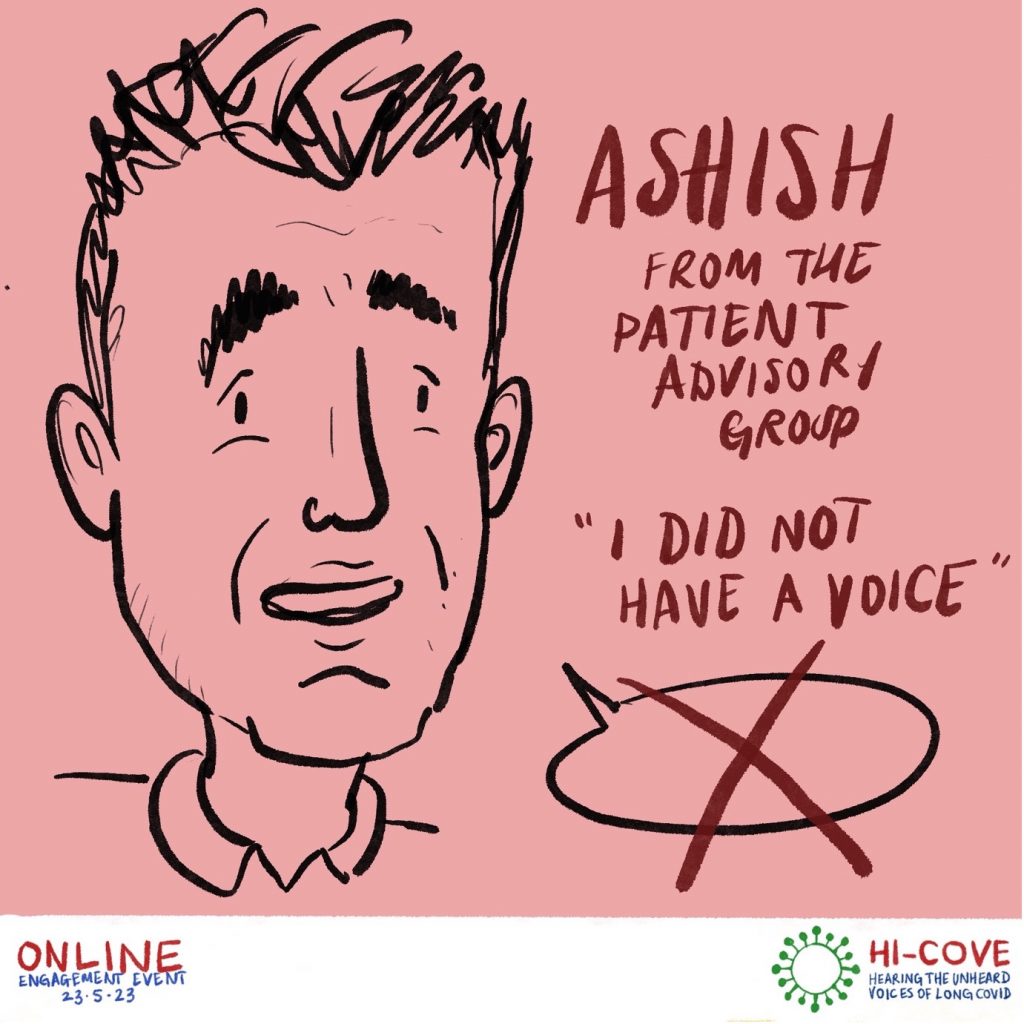
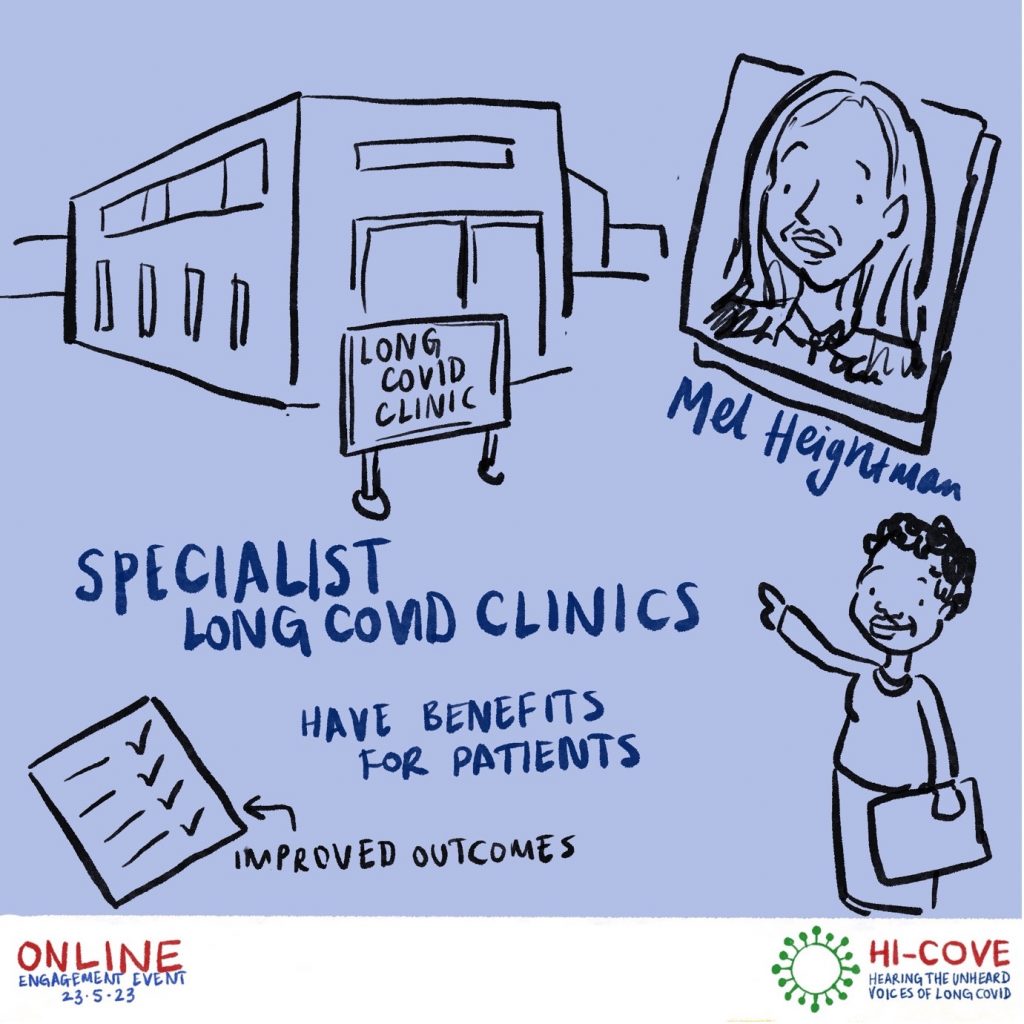
Dr Mel Heightman, Respiratory Medicine, University College London Hospitals NHS Foundation Trust, outlined the benefit of the Long Covid service set up at University College London Hospital UCLH – she reported that 5000 people have been through the clinic so far. She recognised the complexity of treating Long Covid, and the need for some patients to return to and from different services offered through specialist services. She highlighted the importance of multidisciplinary teams and joining up of services. However, it was acknowledged by members of the event that not all Long Covid services are equipped to offer the commendable services at UCLH.
Professor Nisreen Alwan, member of the HI-COVE team, and Dr Donna Clutterbuck, spoke about the STIMULATE-ICP study. Part of the study takes a community-based approach to understanding barriers to accessing support and treatment in those with no confirmed clinical diagnosis of Long Covid. The study is co-produced with a community advisory board of people with Long Covid. It appears self-doubt, secrecy, and anticipated stigma may be deterring people from accessing support. Click here for more details about this study.
We next heard from Val Bayliss-Brideaux who now runs the Greater Manchester Long Covid support group (click here for more information about the group).
This group meet weekly online and have an active What’s App group which offers a safe space for sharing stories of Long Covid. She highlighted the importance of peer support in the community to support self-management of Long Covid. They have done much work with people from racially and ethnically minoritised communities. They highlight the disproportionate impact of COVID-19 on these groups. In line with HI-COVE findings, the people they work with find access to support challenging, especially in relation to health, social care, and employment. This is coupled with the challenges faced by poverty and cost of living increases. Val highlighted the importance of needing culturally appropriate support for these groups; many didn’t have the equipment or resources to meet basic needs and were living with an unknown condition, Long Covid.
Davine Forde, shared her experiences of living with Long Covid and spoke about the value of this group in supporting her, simply being around others who understand, as she lives with Long Covid.
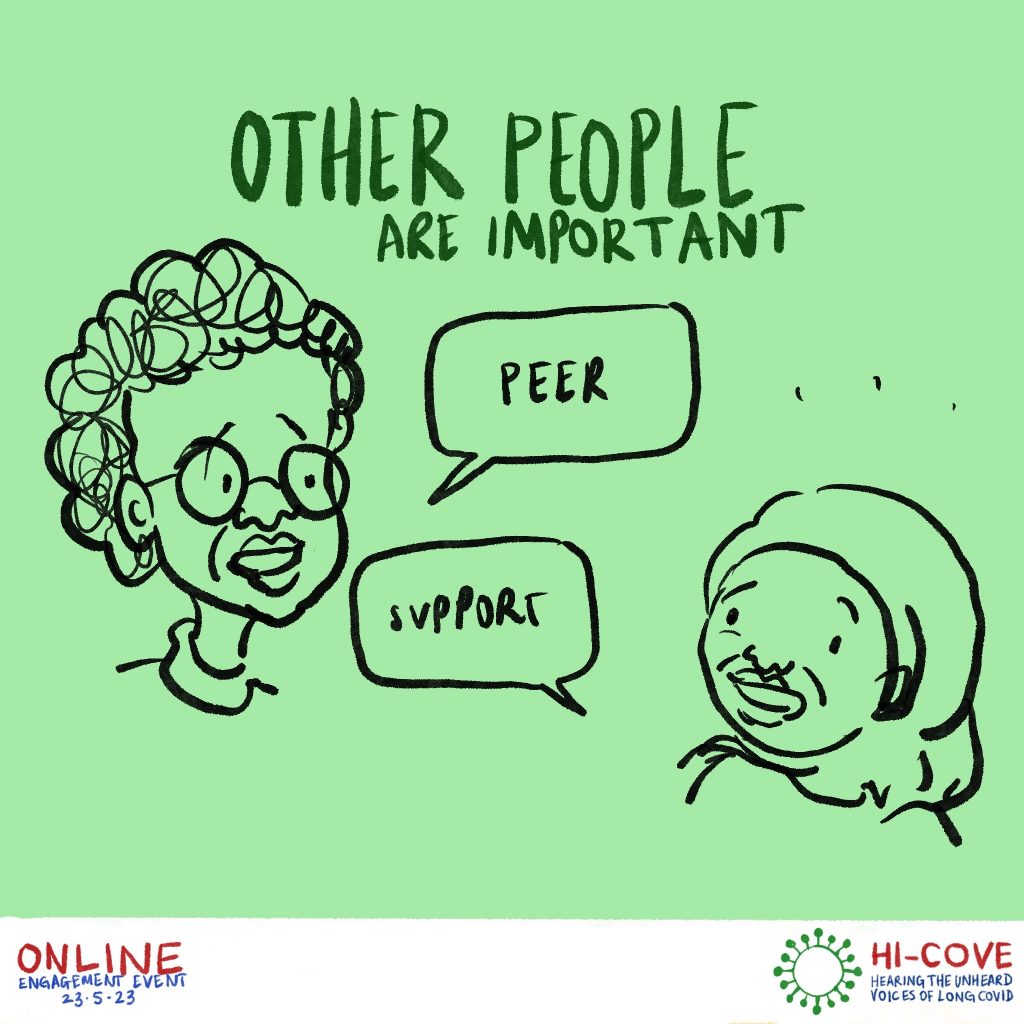
Alexa Wright, an Artist and member of the HI-COVE study team, has been working with interview participants to collaboratively create a video to represent experiences of Long Covid. A clip of the video was shared during the webinar (the final video will be available at a later date). Using art in this way connects viewers empathetically with lived experiences in a way that reports and presentations cannot. The HI-COVE team will use this video to raise awareness of Long Covid and challenges people face. Click here for other work by Alexa.
The key observation from participants was that the HI-COVE findings resonate with work that has gone before, but action is needed, rather than simply describing what people with Long Covid all know. The challenge was set for the research team to take action: Suggestions included the need for champions to spread the key messages and developing training for health and social care professionals.
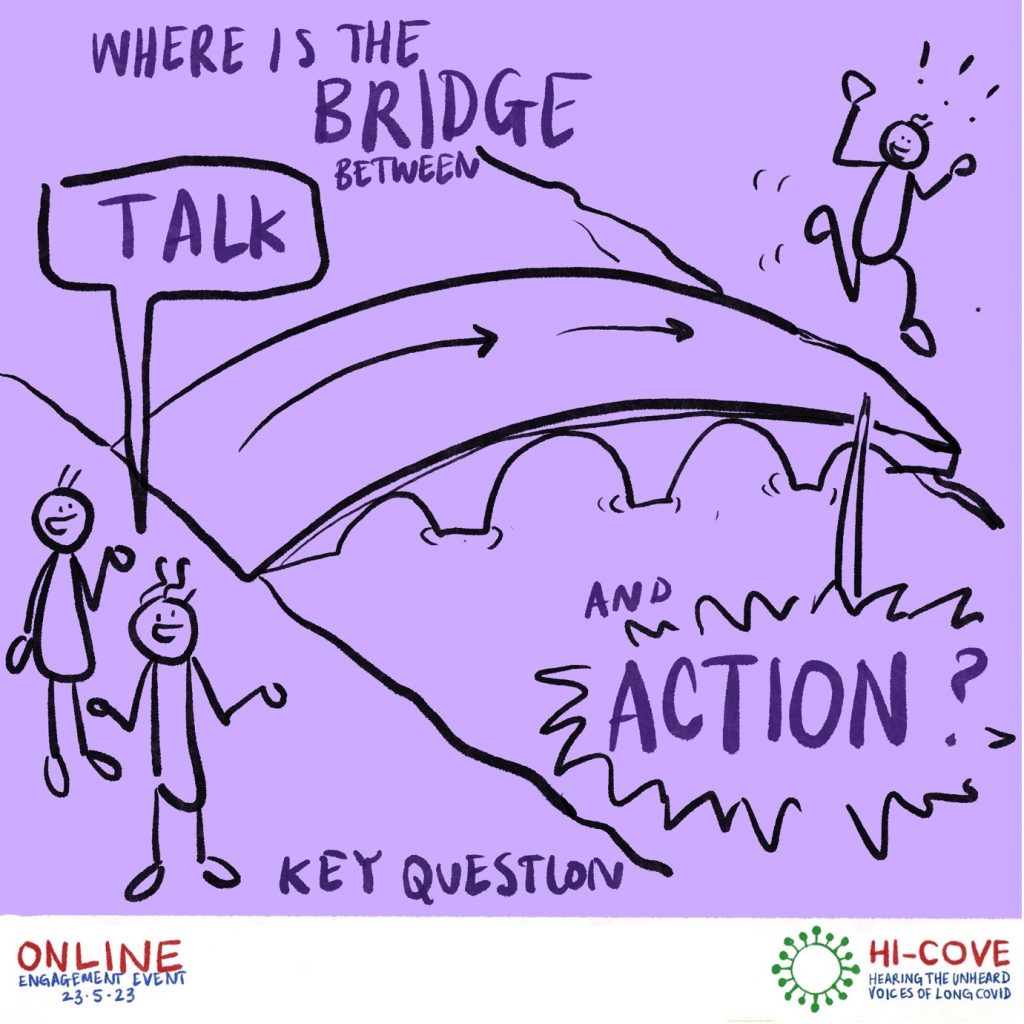
Thank you to all participants in the webinar and the HI-COVE study, and do look out for more information on this work and our future plans.
The research team, HI-COVE
https://blog.westminster.ac.uk/hicovestudy/
Principal Investigators: Dr Nina Smyth; Prof. Damien Ridge Co-applicants: Prof. Nisreen Alwan; Dr Rebecca Band; Prof. Carolyn Chew-Graham; Dr Dipesh Gopal; Dr Tom Kingstone; and Alexa Wright
Project funders: National Institute for Health Research (NIHR 203106) and hosted by Midlands Partnership NHS Foundation Trust.